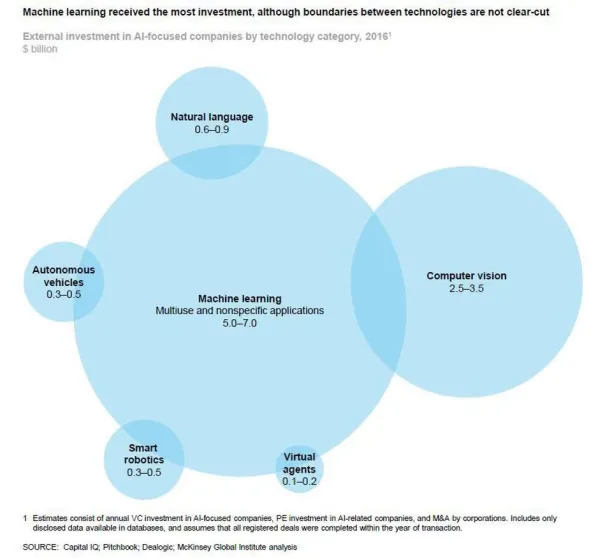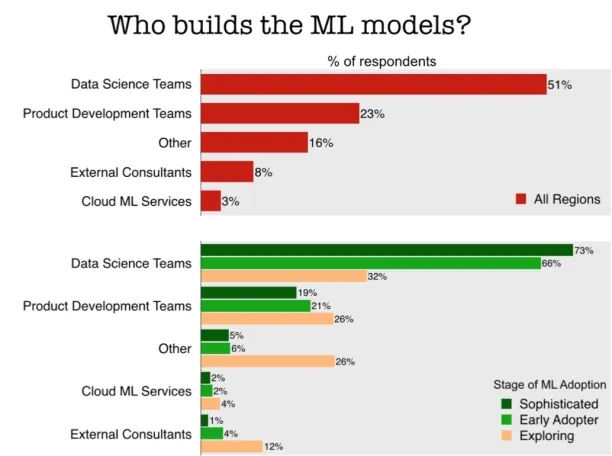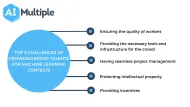45 Statistics, Facts & Forecasts on Machine Learning [2024]
![45 Statistics, Facts & Forecasts on Machine Learning [2024]](https://research.aimultiple.com/wp-content/uploads/2020/10/Screen-Shot-2023-01-23-at-8.55.33-PM-382x194.png.webp)
![45 Statistics, Facts & Forecasts on Machine Learning [2024]](https://research.aimultiple.com/wp-content/uploads/2020/10/Screen-Shot-2023-01-23-at-8.55.33-PM-824x418.png.webp)
Machine learning is the study of computer algorithms that learn through data. Machine learning is regarded as a subset of artificial intelligence. Surveys and market researches are the best way to understand the overall view of the machine learning market because numbers can reveal metrics from the importance of the market to its challenges.
This article is a collection of 40+ up-to-date machine learning specific statistics from the surveys and researches of reputable sources. However, AI, AutoML and even chatbots are adjacent markets where information on these markets overlaps with ML. Therefore feel free to check out these articles if your focus is on these topics:
- 130+ Statistics on Artificial Intelligence (AI)
- 27 AutoML Statistics: Market Size, Adoption & Benefits
- 80+ Chatbot /Conversational AI Statistics: Market Size, Adoption
In this article, you will find machine learning stats about:
Market Forecasts
- The machine learning market expected to grow from $1 Billion in 2016 to USD 9 Billion by 2022, at a CAGR of 44% during the forecast period. (Market and Markets)
- The value of global machine learning market was $8 billion in 2019 and is likely to reach USD 117 billion by the end of 2027 at a CAGR of 39%. (GlobeNewswire)
Market Adoption
C-level executives are understanding the opportunities machine learning investments can bring for the company, therefore, more businesses are deploying ML models:
- According to Refinitiv AI/ML Survey,
- 46% of respondent have deployed ML in multiple areas and it is core to business
- 44% of respondent have deployed ML in pockets
- 10% of respondents are experimenting and investing in infrastructure and people
- North America (80%) leads in ML adoption, and it is followed by Asia (37%) and Europe (29%) (Refinitiv)
- 55% of companies have not deployed a machine learning model.(Algorithmia)
- The total funding allocated to machine learning worldwide during the first quarter of 2019 is $29 billion. (Statista)
- Budgets for ML programs are growing most often by 25%, and the banking, manufacturing, and IT industries have seen the largest budget growth this year. (Algorithmia)
- 20% of C-level executives (across 10 countries and 14 different industries) report that they are using machine learning as a core part of their business. (Mckinsey)
- The total annual external investment was estimated $8 to $12 billion in 2016. And machine learning attracted almost 60% of that investment. It is most likely because machine learning is an enabler for so many other technologies and applications, such as robotics and speech recognition. (Mckinsey)

Why machine learning matters?
- According to Data Scientists and C-level executives, top drivers of ML adoption are (Refinitiv)
- Extracting better quality information (60%)
- Increasing productivity and speed in processes (48%)
- Reducing costs (46%)
- Extracting more value from data (31%)
- 65% of companies who are planning to adopt machine learning say the technology helps businesses in decision-making. (MemSQL)
- 74 % of respondents consider ML and AI to be a game changer, indicating it had the potential to transform their job and industry. (MemSQL)
- Deep learning techniques (feed forward neural networks, recurrent neural networks, and convolutional neural networks) account for ~40% of the annual value potentially created by all analytics techniques. (Mckinsey*)
Machine Learning Talent
- Job titles specific to machine learning are already widely used at organizations with extensive experience in machine learning: data scientist (81%), machine learning engineer (39%), and deep learning engineer (20%). (O’Reilly)
- In the U.S., only 4.5% of self-reported data scientists or data researchers specifically work as machine learning engineers. (Kaggle)
- As of 2020, the average annual salary of a full-time data scientist is $120,000 in the US. (Thinkful)
- Machine learning, NLP and deep learning are the three most in-demand skills on Monster.com (Towards Data Science)
- 50% of respondents said their companies employ between one and 10 data scientists. This is actually down from 2018 wherein 58% of companies claimed to employ between one and 10 data scientists. (Algorithmia)
- In 2018, 18% of companies employed 11 or more data scientists. In 2020, however, that number increased to 39%, which means businesses are ramping up their hiring efforts to build a larger data science team.(Algorithmia)
- Between 2012 and 2017, the number of data scientist jobs on LinkedIn increased by more than 650% (KDnuggets).
Implementation
- The time it takes an organization to deploy a single ML model as share of companies:
- 14%: 0-7 days
- 28%: 8-30 days
- 22%: 1-3 months
- 13%: 3 months to 1 year
- 5%: more than 1 year
- 18%: Don’t know or not sure about the implementation time of a single ML model. (Algorithmia)
- 51% of respondents use internal data science teams to build their machine learning models, whereas use of AutoML services from cloud providers is in low single digits, and this split grows even more pronounced among sophisticated teams. Companies with less extensive experience tend to rely on external consultants. (O’Reilly)
- However, that number rises considerably as organizations gain more experience. 12% of those who belonged to organizations that are just beginning to explore machine learning stated that they relied on external consultants, whereas 73% of those who belonged to the most sophisticated companies relied on their internal data science teams. Not many respondents belonged to organizations that rely on AutoML services offered by cloud providers. (O’Reilly)

Application Areas/ Use Cases
- According to IT leaders, top areas for machine learning technology adoption are (Statista*)
- Business Analytics (33%)
- Security (25%)
- Sales & Marketing (16%)
- Customer Service (10%)
- Other (16%)
- According to Data Scientists and C-level executives, top applications of machine learning are (Refinitiv)
- Risk Management (82%)
- Performance Analysis & Reporting (74%)
- Trading investment idea generation (63%)
- Automation (61%)
- 58% of businesses using machine learning say they ran models in production. (MemSQL)
- 87% of companies who use AI plan to use them in sales forecasting and email marketing.(Statista**)
Results/ Benefits
Businesses who rely on machine learning models collect returns either through cost reduction, improved operations or increased revenue.
- Netflix saved $1 billion in 2017 as a result of its machine learning algorithm which recommends personalized TV shows and movies to subscribers. (Forbes)
- Using a machine learning algorithm, Amazon automates picking and packing items in a warehouse logistics setting. With Kiva’s capabilities, Amazon’s average ‘click to ship’ time reduced by 225% from 60-75 minutes to 15 minutes. (Forbes)
- Google’s Deep Learning machine learning program is accurate 89% of the time in detecting breast cancer. That’s much more effective compare to pathologists at 74%. (Google AI Blog)
- The accuracy of Google translates increased from 55% to 85% after using a machine learning algorithm. (Mike Schuster)
- The accuracy of Google AI’s machine learning algorithm in predicting a patients’ death is 95%. (Bloomberg)
- The accuracy of Azure Machine Learning framework in predicting stock market highs and lows is 62%. (Microsoft)
Challenges
As data is the fuel of machine learning models, common challenges in data management and quality also apply to machine learning algorithms. Some challenges are data preparation, data processing and finding data science talent:
- 12.5% of employee time is lost in data collection. That’s five hours a week in a 40-hour workweek. (Data Dilemma Report)
- 40% of respondents indicated their organizations check for model fairness and bias. This ratio increases to one in two (54%) when only companies with extensive machine learning experience are included. (O’Reilly)
- Among companies with extensive experience in machine learning, only one in two (53%) companies check for data privacy implications in machine learning projects. The ratio drops to 43% when all companies are included. (O’Reilly)
- According to Refinitiv survey (2019), top challenges of machine learning adoption are
- Poor data quality (43%)
- Lack of data availability (38%)
- Finding data science talent (33%)
- According to Algorithmia survey (2020), top challenges of machine learning adoption are
- Scaling models (43%)
- Versioning and reproducibility of models (41%)
- Getting organizational alignment and senior buy-in for ML initiatives (34%)
Investments
- In 2016, Google invested $4.5 million in the Montreal Institute for Learning Algorithms, a research lab at the University of Montreal. (Techcrunch)
- Intel donated $1.5 million to establish a machine learning and cybersecurity research center at Georgia Tech. (Mckinsey)
- As of October 2020, the total number of funding rounds for machine learning companies is more than 4400 and the total funding amount raised across all funding rounds is $3.1B. (Crunchbase)
Quotes on Machine Learning
- “The greatest benefit of machine learning may ultimately be not what the machines learn but what we learn by teaching them.” ― Pedro Domingos, The Master Algorithm: How the Quest for the Ultimate Learning Machine Will Remake Our World
- “Much of what we do with machine learning happens beneath the surface. Machine learning drives our algorithms for demand forecasting, product search ranking, product and deals recommendations, merchandising placements, fraud detection, translations, and much more. Though less visible, much of the impact of machine learning will be of this type — quietly but meaningfully improving core operations.” -Jeff Bezos
- “A baby learns to crawl, walk and then run. We are in the crawling stage when it comes to applying machine learning.” -Dave Waters
- “Artificial Intelligence, deep learning, machine learning — whatever you’re doing if you don’t understand it — learn it. Because otherwise you’re going to be a dinosaur within 3 years.” -Mark Cuban
- “Harnessing machine learning can be transformational, but for it to be successful, enterprises need leadership from the top. This means understanding that when machine learning changes one part of the business — the product mix, for example — then other parts must also change. This can include everything from marketing and production to supply chain, and even hiring and incentive systems.” -Erik Brynjolfsson, Director of the MIT Initiative on the Digital Economy.
For more on machine learning:
- Decision Intelligence: In-Depth guide for businesses
- 22 AutoML Case Studies / Examples
- AutoML: In depth Guide to Automated Machine Learning
Finally, If you want to get started with AutoML in your business, you can view our data-driven list of Machine learning (ML) software. If you still have questions on the topic, feel free to contact us:
Sources: Algorithmia, Bloomberg, Crunchbase, Data Dilemma Report, Forbes, Google AI Blog, GlobeNewswire, Kaggle, KDnuggets, Market and Markets, Mckinsey, Mckinsey*, Microsoft, Mike Schuster, MemSQL, O’Reilly, Refinitiv AI/ML Survey, Statista, Statista*, Statista**, Techcrunch, Thinkful, Towards Data Science

Cem has been the principal analyst at AIMultiple since 2017. AIMultiple informs hundreds of thousands of businesses (as per similarWeb) including 60% of Fortune 500 every month.
Cem's work has been cited by leading global publications including Business Insider, Forbes, Washington Post, global firms like Deloitte, HPE, NGOs like World Economic Forum and supranational organizations like European Commission. You can see more reputable companies and media that referenced AIMultiple.
Throughout his career, Cem served as a tech consultant, tech buyer and tech entrepreneur. He advised businesses on their enterprise software, automation, cloud, AI / ML and other technology related decisions at McKinsey & Company and Altman Solon for more than a decade. He also published a McKinsey report on digitalization.
He led technology strategy and procurement of a telco while reporting to the CEO. He has also led commercial growth of deep tech company Hypatos that reached a 7 digit annual recurring revenue and a 9 digit valuation from 0 within 2 years. Cem's work in Hypatos was covered by leading technology publications like TechCrunch and Business Insider.
Cem regularly speaks at international technology conferences. He graduated from Bogazici University as a computer engineer and holds an MBA from Columbia Business School.
To stay up-to-date on B2B tech & accelerate your enterprise:
Follow on

Comments
Your email address will not be published. All fields are required.